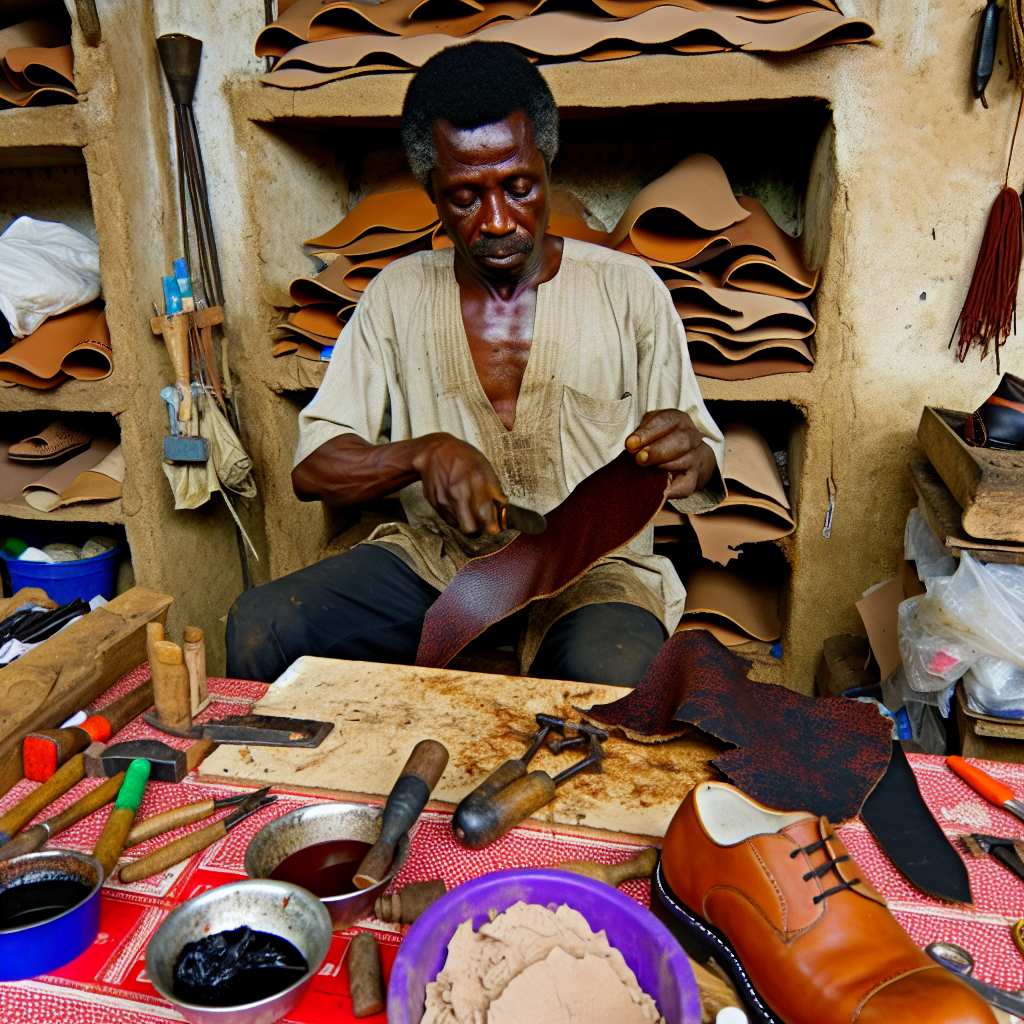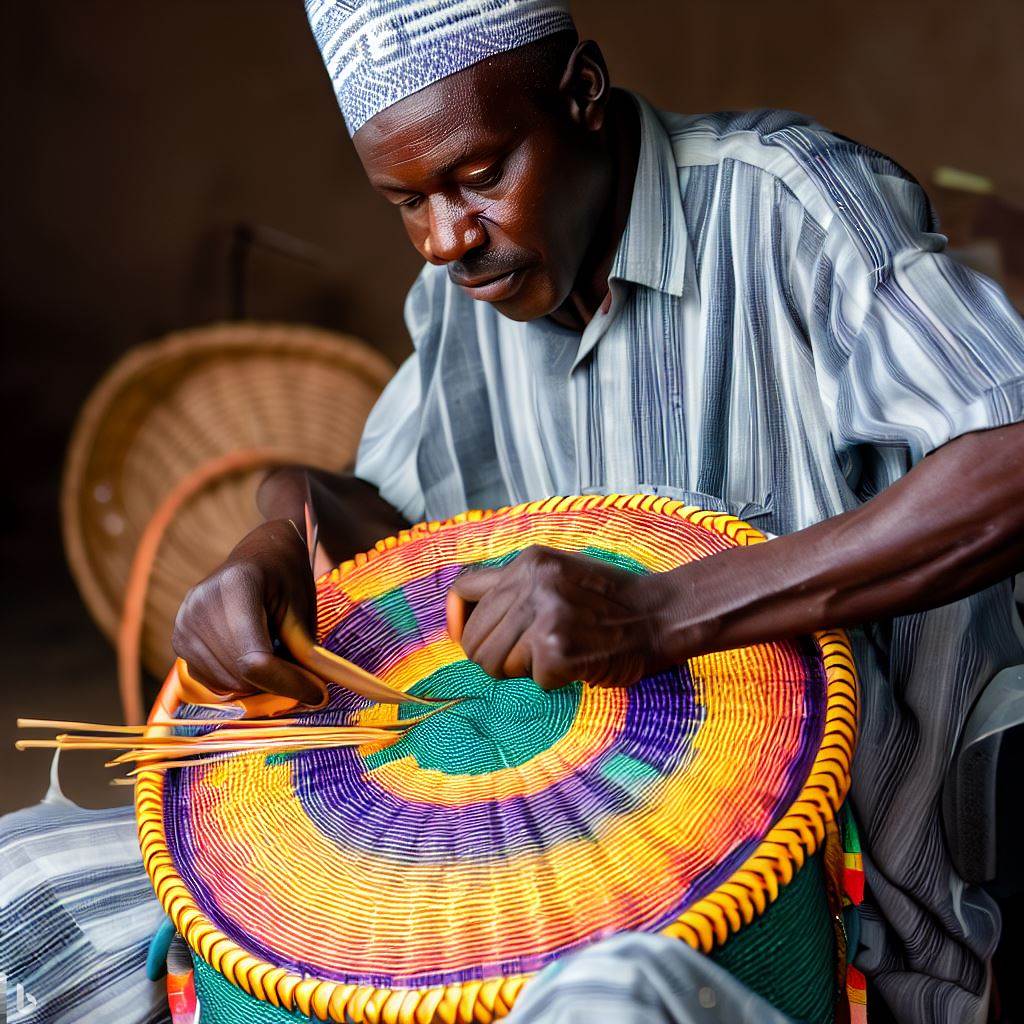Introduction to the Shoemaking Profession in Nigeria
Shoemaking in Nigeria is a vibrant and growing trade.
Many people see it as a viable career path.
This profession combines artistry and craftsmanship.
The industry caters to various needs, from formal shoes to casual footwear.
The Importance of Shoemaking
Shoemaking plays a crucial role in the economy.
It provides employment opportunities for skilled artisans.
Additionally, the trade supports local materials and resources.
Local shoemakers contribute to the community by promoting traditional craftsmanship.
Training and Skill Development
To build a career in shoemaking, proper training is essential.
Many aspiring shoemakers start with apprenticeships.
These apprenticeships provide hands-on experience and mentorship.
Formal education programs also exist for shoemaking techniques.
The Market for Footwear in Nigeria
The demand for shoes in Nigeria is growing.
With a young population, the trend for fashionable footwear increases.
Local and international brands are expanding their reach.
Transform Your Career in Nigeria
Discover unmatched expertise with our personalized Career Consulting service. Navigate Nigeria’s job market with a strategy tailored just for you.
Get StartedThis creates opportunities for local shoemakers to thrive.
Challenges Faced by Shoemakers
Despite the opportunities, shoemakers face challenges.
One major issue is competition from imports.
Additionally, access to quality materials can be limited.
However, innovative shoemakers find ways to overcome these obstacles.
Networking and Building a Brand
Building a reputation is crucial in this industry.
Shoemakers should focus on quality craftsmanship and customer service.
Networking within the community can lead to valuable connections.
Social media also offers platforms for showcasing products.
Future Prospects for Shoemakers
The future for shoemaking in Nigeria appears promising.
The rise of e-commerce creates wider market access.
Furthermore, sustainable practices are becoming important in fashion.
As such, artisans who adapt to these trends will likely succeed.
Understanding the Different Types of Shoes and Their Markets
Types of Shoes
Shoes come in various types, each serving unique purposes.
Casual shoes are popular for everyday wear.
These shoes are designed for comfort and style.
Sports shoes cater to specific athletic activities.
They enhance performance and provide support.
Formal shoes are a staple for professional settings.
These shoes often feature sleek designs and quality materials.
Additionally, boots provide protection and warmth.
They are essential for harsh weather conditions.
Sandals offer breathability for warm climates.
They are easy to wear and versatile.
Publish Your Professional Profile, Business or Brand
Showcase your expertise, gain trust, and boost visibility instantly on Professions.ng.
Publish NowTarget Markets
Understanding target markets is crucial for success.
Each shoe type appeals to different customer demographics.
Younger consumers often prefer trendy casual options.
In contrast, professionals seek reliable formal footwear.
Athletes look for performance-driven sports shoes.
Moreover, parents often purchase children’s shoes for growth and durability.
Boots are popular among outdoor enthusiasts and workers.
Finally, sandals attract those seeking comfort in hot weather.
Market Trends
Current trends impact shoe types and styles significantly.
Sustainability is gaining importance among consumers.
More shoppers prefer eco-friendly materials and production processes.
Customization is another popular trend in the footwear industry.
Consumers enjoy personalized designs and fits.
Moreover, technology integration in shoes is on the rise.
Smart shoes with fitness tracking features are emerging in the market.
Understanding these trends can guide your choice in production.
Essential Skills Required to Become a Successful Shoemaker
Craftsmanship
Mastering the art of shoemaking requires excellent craftsmanship.
You must learn precise techniques to ensure high-quality products.
Attention to detail significantly enhances your work’s quality.
Design Skills
Creativity plays a vital role in shoemaking design.
You should be able to visualize and sketch various styles.
Understanding current fashion trends allows you to stay relevant.
Knowledge of Materials
Familiarity with different materials is crucial for a shoemaker.
Leather, rubber, and synthetic materials each have unique features.
You will need to choose the right material for each project.
Technical Skills
Proficiency in using tools is essential for shoemakers.
You must be able to operate sewing machines and hand tools effectively.
Understanding construction methods enhances your technical ability.
Business Acumen
Starting your own shoemaking business requires business skills.
Financial management helps in budgeting and investing wisely.
Marketing skills can help you reach new customers effectively.
Customer Service
Excellent customer service builds a loyal clientele.
You should communicate effectively with customers to understand their needs.
Being responsive to feedback improves overall customer satisfaction.
Problem-Solving
As a shoemaker, you will face various challenges.
Developing problem-solving skills enables you to find effective solutions.
Being adaptable will help you overcome unexpected obstacles.
Continuous Learning
The shoemaking industry is always evolving.
You should stay updated on new techniques and materials.
Participating in workshops and training can enhance your skills.
Publish Your Professional Profile, Business or Brand
Showcase your expertise, gain trust, and boost visibility instantly on Professions.ng.
Publish NowLearn More: Mastering the Art of Welding: How to Build a Career in Nigeria
Steps to Acquire Shoemaking Knowledge and Training
Research the Craft
Start by exploring the art of shoemaking online.
Look for articles, blogs, and videos that discuss the craft.
Join online forums focused on shoe design and production.
Enroll in a Shoemaking Course
Find reputable institutions that offer shoemaking courses.
Consider schools like the Nigerian Institute of Leather Technology.
Online platforms also provide courses for flexible learning.
Gain Practical Experience
Seek internships with local shoemakers or factories.
This hands-on experience is invaluable for mastering techniques.
Volunteer to help in workshops or shoemaking apprenticeships.
Learn from Established Shoemakers
Identify successful shoemakers in your area.
Reach out to them for mentorship or advice.
Attend workshops they may hold to gain insights.
Utilize Online Resources
Access online tutorials and videos that demonstrate shoemaking.
Participate in online communities that share tips and tricks.
Follow blogs dedicated to crafting and designing shoes.
Practice Regularly
Dedicate time each week to practice shoemaking skills.
Experiment with different designs and materials for variety.
Document your progress to see improvement over time.
Attend Shoemaking Workshops
Look for workshops organized by experienced shoemakers.
These short courses can offer concentrated skills training.
Engage with peers for collaborative learning experiences.
Build a Portfolio
Compile your work to showcase your skills.
Include photographs of finished shoes and sketches.
Use this portfolio to attract potential clients or employers.
Network with Industry Professionals
Join local shoemaking or leatherworking associations.
Attend trade shows and exhibitions to meet professionals.
Networking helps you stay updated on industry trends.
Market Your Skills
Create social media accounts to showcase your work.
Consider setting up an online store for your creations.
Engage with customers to build a loyal client base.
Discover More: How to Build a Career as a Professional Plumber in Nigeria
Choosing the Right Tools and Materials for Shoemaking
Understanding Essential Tools
Every shoemaker needs specific tools to create quality footwear.
Start with a sharp knife for cutting leather and other materials.
A durable cutting mat protects your work surface.
Include a set of chisels for making precise cuts and adjustments.
Invest in a good pair of scissors for trimming edges smoothly.
You should also have a hammer for driving nails and adjustments.
Last but not least, consider a last, which shapes the shoe during construction.
Selecting High-Quality Materials
Quality materials determine the longevity of your shoes.
Publish Your Professional Profile, Business or Brand
Showcase your expertise, gain trust, and boost visibility instantly on Professions.ng.
Publish NowLeather is the primary material for most shoemaking.
Choose vegetable-tanned leather for durability and breathability.
Consider synthetic alternatives for colorful designs and lower costs.
Don’t forget to source strong thread for stitching leather pieces together.
Rubber or leather soles provide excellent grip and comfort.
Additionally, keep a variety of linings for comfort and moisture control.
Managing Your Supplies
Proper management of tools and materials enhances efficiency.
Organize your workspace to keep everything accessible.
Store materials in a controlled environment to prevent damage.
Regularly check your supplies to avoid running out during projects.
Consider bulk purchasing for commonly used items to save costs.
Lastly, maintain your tools for long-lasting performance.
You Might Also Like: Mastering the Craft: How to Become a Skilled Carpenter in Nigeria

Building a Network and Gaining Experience in the Industry
Connecting with Industry Professionals
Start by attending local shoe fairs and trade shows.
These events provide excellent opportunities to meet successful shoemakers.
Engage with sellers and suppliers to broaden your contacts.
Use social media platforms like LinkedIn to connect with professionals.
Join online forums and groups focused on shoemaking in Nigeria.
Apprenticeships and Internships
Seek apprenticeship opportunities with experienced shoemakers.
An apprenticeship lets you learn practical skills firsthand.
Look for internships at established shoe brands.
This experience enhances your resume and skills portfolio.
Talk to local artisans for potential apprenticeship offers.
Participating in Local Workshops
Enroll in workshops to enhance your craftsmanship.
These workshops often cover advanced techniques and styles.
Learn from both peers and seasoned professionals.
Consider hosting your own workshops to share knowledge.
Building community ties helps foster relationships and trust.
Continuous Learning and Development
Stay updated with the latest trends in shoemaking.
Attend seminars and webinars that focus on new techniques.
Read articles and books related to leather craft and design.
Join online courses that enhance your skill set further.
Networking and learning should go hand in hand throughout your career.
Uncover the Details: Top Trade Skills Professions Thriving in Nigeria
Marketing Strategies for Promoting Your Shoemaking Business
Utilizing Social Media
Social media platforms are essential for brand visibility.
Platforms like Instagram and Facebook attract potential customers.
Share high-quality images of your designs regularly.
Engage with your audience through comments and messages.
Run targeted ads to reach a broader market.
Building a Personal Brand
Establishing a strong personal brand sets you apart.
Publish Your Professional Profile, Business or Brand
Showcase your expertise, gain trust, and boost visibility instantly on Professions.ng.
Publish NowCreate a unique story around your brand’s origins.
Highlight your craftsmanship and attention to detail.
Share testimonials from satisfied customers.
Networking with Local Businesses
Collaborate with local boutiques and clothing stores.
Offer to display your shoes in their shops.
Join local artisans’ fairs and markets to showcase your work.
Attend networking events to meet other entrepreneurs.
Implementing Email Marketing
Email marketing helps maintain customer relationships.
Collect emails through your website and social media.
Send newsletters with updates and promotions.
Personalize emails to make customers feel valued.
Offering Customization Options
Customization appeals to customers seeking unique designs.
Allow customers to choose materials and colors.
Promote your customization services on various platforms.
This strategy can increase customer loyalty and sales.
Participating in Community Events
Attend community events to promote your business.
Set up booth displays at local fairs and festivals.
Offer shoe-making workshops to engage potential customers.
These events can build brand awareness and foster connections.
Incorporating Influencer Collaborations
Partner with social media influencers in the fashion niche.
Influencers can introduce your brand to their followers.
Choose influencers whose style aligns with your products.
Monitor engagement metrics to assess the effectiveness.
Run Seasonal Promotions
Seasonal promotions create urgency among customers.
Offer discounts during holidays or special occasions.
Promote these sales through your marketing channels.
Encourage customers to share their purchases on social media.
Overcoming Challenges in the Shoemaking Industry in Nigeria
Understanding the Challenges
The shoemaking industry in Nigeria faces numerous challenges.
Firstly, access to quality raw materials is often limited.
Additionally, high production costs create barriers for many artisans.
Competition from imported footwear further complicates the landscape.
Moreover, the lack of adequate training hinders skill development.
Finding Solutions
Addressing these challenges requires creative solutions.
Collaboration with local suppliers can improve raw material access.
Engaging in cost-reduction methods can enhance profitability.
Moreover, developing unique designs can help differentiate local brands.
Establishing training centers will empower aspiring shoemakers.
Leveraging Technology
Technology plays a crucial role in overcoming industry hurdles.
Online platforms can help artisans showcase their products.
Additionally, social media marketing can expand customer reach.
Publish Your Professional Profile, Business or Brand
Showcase your expertise, gain trust, and boost visibility instantly on Professions.ng.
Publish NowInvesting in modern machinery can enhance production efficiency.
Finally, adopting e-commerce solutions can facilitate sales.
Building Community Support
Community support is vital for success in shoemaking.
Networking with other shoemakers fosters collaboration.
Participating in trade fairs can boost visibility and connections.
Furthermore, creating awareness about local products encourages patronage.
Ultimately, fostering a supportive community strengthens the industry.
Additional Resources
“Flying Geese” or False Promises: Assessing the Viability of Foreign …
I love hearing how my ebook is making an impact! One reader just …




